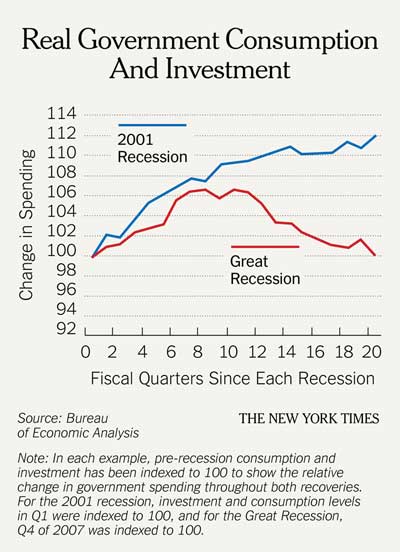
Most analysts are, rightly, shrugging off the recent surprise report of an actual decline in fourth-quarter gross domestic product in the United States. It will probably be revised away, and in any case it’s the result of one-off factors: a drop in inventories and a quirky sharp decline in defense spending.
Still, the report does highlight the role that shrinking government purchases of goods and services are playing in holding the economy back. And yes, I mean shrinking, not just growing more slowly than I’d like. Transfer payments like Medicare and Social Security are rising (although unemployment benefits are falling), but government purchases of stuff — mostly at the state and local level, where the stuff in question includes hiring schoolteachers — has been in fairly rapid decline.
 Here’s a comparison on this page, using statistics from the Bureau of Economic Analysis, of the relevant numbers in the current business cycle and during the Bush-era recession and aftermath. By this measure, the era since the Great Recession began has been marked by unprecedented fiscal austerity.
Here’s a comparison on this page, using statistics from the Bureau of Economic Analysis, of the relevant numbers in the current business cycle and during the Bush-era recession and aftermath. By this measure, the era since the Great Recession began has been marked by unprecedented fiscal austerity.
How big a deal is this? Government consumption and investment is about $3 trillion; if it had grown as fast this time as it did during President George W. Bush’s administration, it would be 12 percent, or $360 billion, higher.
Given a multiplier of more than one, which is what the International Monetary Fund, among others, now thinks reasonable under current conditions, that ends up meaning that the country’s G.D.P. would be something like $450 billion higher, which is 3 percent — and the unemployment rate would be 1.5 points lower.
So fiscal austerity is the difference between where we are now and an unemployment rate not much above 6 percent. It’s a policy disaster.
Despicable Me
Funny: Angry Bear (angrybearblog.com) recently found some of the usual suspects explaining “How to Debate Paul Krugman,” and the answer appears to be this: invent a straw man who bears no resemblance at all to the economist/columnist of the same name, and ridicule that imaginary person.
I have to say, never in my wildest dreams did I imagine that I could play the role of History’s Greatest Monster to so many people. Thank you for the honor!
Aside from the silliness of the exercise, this little exchange is another illustration of a point I’ve noticed before: the way hard-right commentators assume that the other side must be their mirror image. They insist that no government intervention is ever justified, so liberals must support any and all government interventions. They want smaller government, as a principle; liberals must want bigger government, never mind what for. They believe that deficits and printing money are always evil; liberals must be for deficits and money-printing under all circumstances.
An hour spent browsing my articles would quickly refute all of this, together with the bizarre charge that I never look at evidence; you may not agree with my conclusions, but I sure do post a lot of numbers. But obviously looking at what I actually write would just be too painful.
Anyway: thanks, guys — you made my day.
Join us in defending the truth before it’s too late
The future of independent journalism is uncertain, and the consequences of losing it are too grave to ignore. To ensure Truthout remains safe, strong, and free, we need to raise $27,000 in the next 24 hours. Every dollar raised goes directly toward the costs of producing news you can trust.
Please give what you can — because by supporting us with a tax-deductible donation, you’re not just preserving a source of news, you’re helping to safeguard what’s left of our democracy.